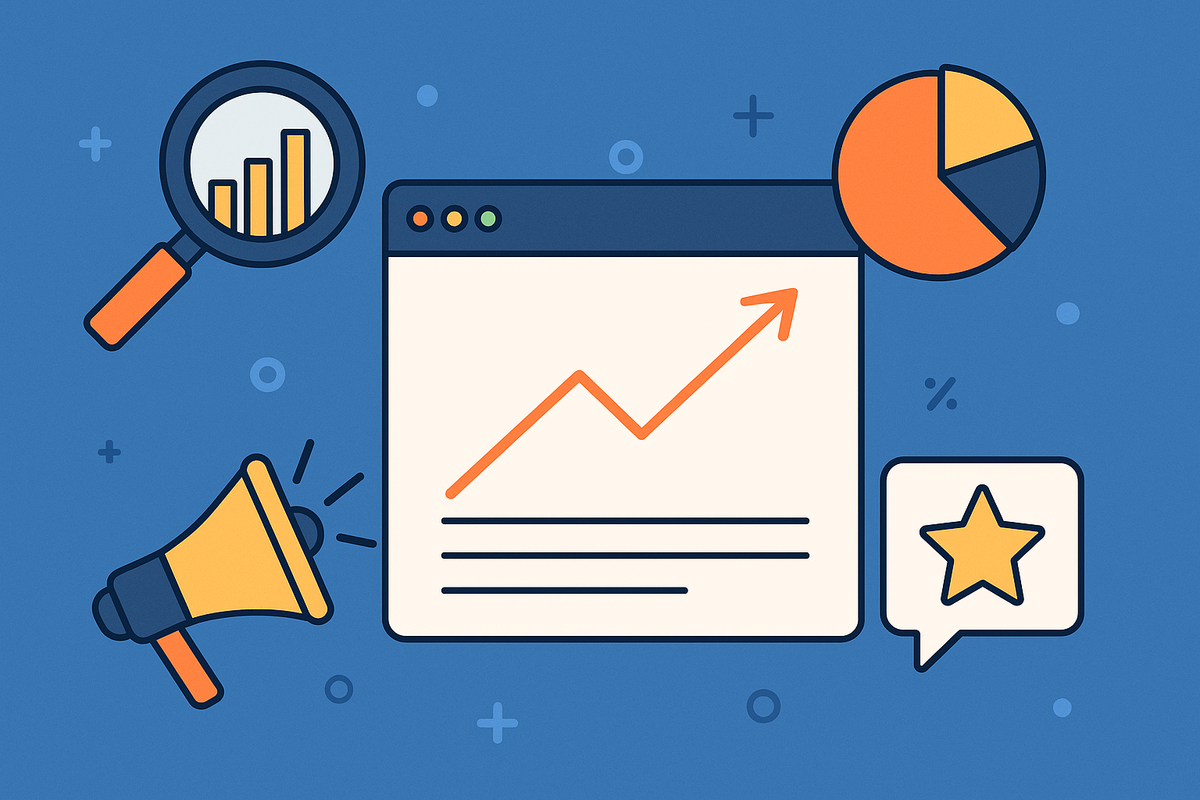The Best Marketing Tools for Small Businesses (2026 Guide)
Discover the top marketing tools for small businesses in 2026 — from local insights to SEO, social media, and analytics. Includes HeyNeighbor’s free Market Research tool for neighborhood-level data.

The Overwhelming World of Marketing Tools
If you’ve ever Googled “best marketing tools for small businesses,” you’ve probably seen hundreds of suggestions — from email platforms to CRMs to social schedulers.
But most of those lists miss something crucial: local context.
Small businesses don’t just need marketing tools — they need tools that help them find, reach, and understand customers nearby. The right mix of software can turn guesswork into strategy, stretch every dollar further, and make marketing feel less like a full-time job.
Below are the most practical tools (and a few hidden gems) that help small businesses grow smarter — not harder — in 2026.
1. Market Research & Local Insights
Before spending a dollar on ads or printing a single flyer, you need to know who lives nearby and where your best opportunities are.
That’s where local data tools come in.
HeyNeighbor Market Research 🏡
Instantly see neighborhood demographics, homeowner data, and income ranges — all by street address.
It’s a fast, visual way for local businesses to identify their most promising neighborhoods before advertising or canvassing. Whether you’re a landscaper, real estate agent, or boutique owner, HeyNeighbor’s free Market Research tool helps you target areas where your next customers already live.
✅ Best for: Home services, real estate, local retail, franchise growth
💡 Pro tip: Compare two neighborhoods side-by-side to decide where to focus your next campaign or mailer.
Other Great Tools for Market Insight
- Google Trends – See what topics and searches are rising in your city or region.
- Meta Audience Insights – Explore audience demographics and interests for Facebook & Instagram ads.
- Typeform or SurveyMonkey – Collect quick customer feedback or neighborhood surveys.
2. Website & SEO Tools
Your website is still your digital storefront — and SEO is how people find it.
Luckily, some tools make it easier to stay visible in local search.
- Google Business Profile – Your must-have local listing. Claim it, fill it out, and post regularly.
- Google Search Console – See what keywords people use to find you and fix issues that hurt rankings.
- Yoast SEO (WordPress) or Squarespace SEO Settings – Simple guidance for optimizing each page.
- Ubersuggest, Ahrefs, or Moz Local – Research competitors, keywords, and backlinks.
- Hotjar – Watch where visitors click, scroll, and drop off to improve your site’s experience.
💡 Pro tip: Create neighborhood landing pages (“Plumber in Park Shore,” “Landscaping in Grey Oaks”) to capture hyper-local searches.
3. Advertising & Customer Reach
Once you know where to focus, it’s time to reach those people effectively.
Here are tools that help you get the right message in front of the right audience.
- HeyNeighbor Ads Platform – You pick the neighborhoods. We run the ads.
Hyper-local targeting across apps, websites, and digital spaces where your customers spend time. - Google Ads Smart Campaigns – Great for simple, automated search visibility.
- Meta Ads Manager – Target by interest, zip, or radius to stay top-of-mind locally.
- Nextdoor Ads – Reach homeowners and neighbors directly in their community feed.
- Mailchimp Ads – Combine email campaigns with remarketing ads to warm audiences.
💡 Pro tip: Use your Market Research data to build audiences before running ads — that’s how you avoid wasted clicks.
4. Content & Social Media Tools
Keeping up with posting, design, and engagement can feel endless — these tools simplify it.
- Canva – Design flyers, ads, and social posts in minutes.
- CapCut or Descript – Edit short-form videos for social media easily.
- Buffer, Later, or Metricool – Schedule and analyze posts across platforms.
- ChatGPT – Generate ideas, headlines, or captions in your tone.
💡 Pro tip: Use Canva templates to keep your brand consistent, then repurpose your best-performing posts into ads.
5. Customer Reviews & Reputation Management
Word of mouth has moved online — reviews are often the deciding factor for local customers.
Make sure you’re capturing (and showcasing) your reputation.
- Google Reviews – Still the most influential.
- HeyNeighbor Reviews (if active) – Collect, manage, and display reviews from verified local customers.
- Birdeye, Podium, or NiceJob – Automate review requests via text or email.
- Trustpilot / Yelp for Business – Great for broader credibility.
💡 Pro tip: Embed top Google reviews directly on your website or HeyNeighbor business profile.
6. Analytics & Reporting Tools
Once your marketing is running, you need to measure what’s working.
These tools simplify data without requiring a full-time analyst.
- Google Analytics 4 (GA4) – Tracks user behavior across your website.
- Looker Studio – Build free visual dashboards (combine data from Ads, GA4, and social).
- HubSpot CRM (Free) – See where your leads come from and track interactions.
- Databox / Funnel.io – Combine metrics from multiple channels in one place.
💡 Pro tip: Create one dashboard that shows clicks, leads, and visits by neighborhood — you’ll instantly see which areas perform best.
7. Automation & Integrations
Connecting your tools saves hours and ensures everything runs smoothly.
- Zapier – Connects 5,000+ apps (e.g., automatically send new form leads into your CRM).
- Make (Integromat) – Visual automation builder for advanced workflows.
- HubSpot Workflows – Simple lead follow-up automations.
💡 Pro tip: Set up a workflow that automatically sends new HeyNeighbor Market Research leads into your email list or CRM.
Putting It All Together
Here’s a simple stack that works beautifully for most small businesses:
| Stage | Tool Example | Purpose |
|---|---|---|
| Research | HeyNeighbor Market Research | Find high-value neighborhoods |
| Build | Squarespace / Canva | Create website and visuals |
| Promote | HeyNeighbor Ads + Meta Ads | Target customers nearby |
| Engage | Mailchimp / Buffer | Stay visible and nurture interest |
| Measure | Looker Studio / GA4 | Track performance by neighborhood |
💬 Final Thoughts
The best marketing tools for small businesses aren’t always the biggest names — they’re the ones that save time, provide clarity, and deliver results close to home.
Start with tools that help you understand your local market, then build upward from there.
And if you want to see where your next customers actually live, try the free HeyNeighbor Market Research tool →





